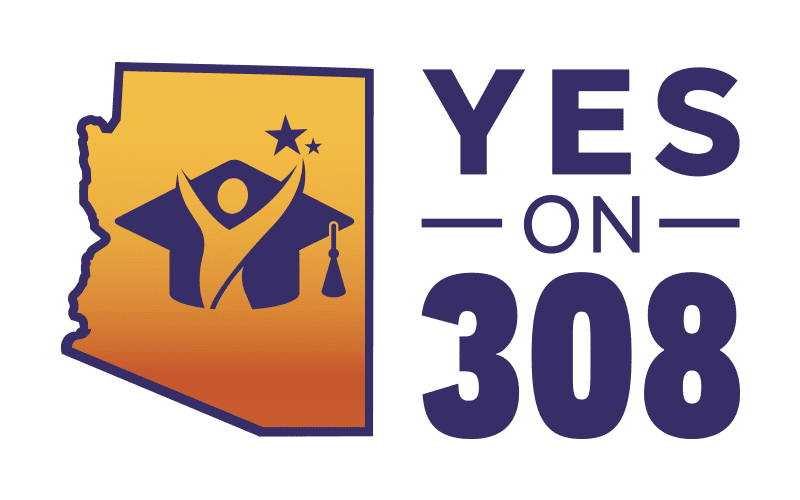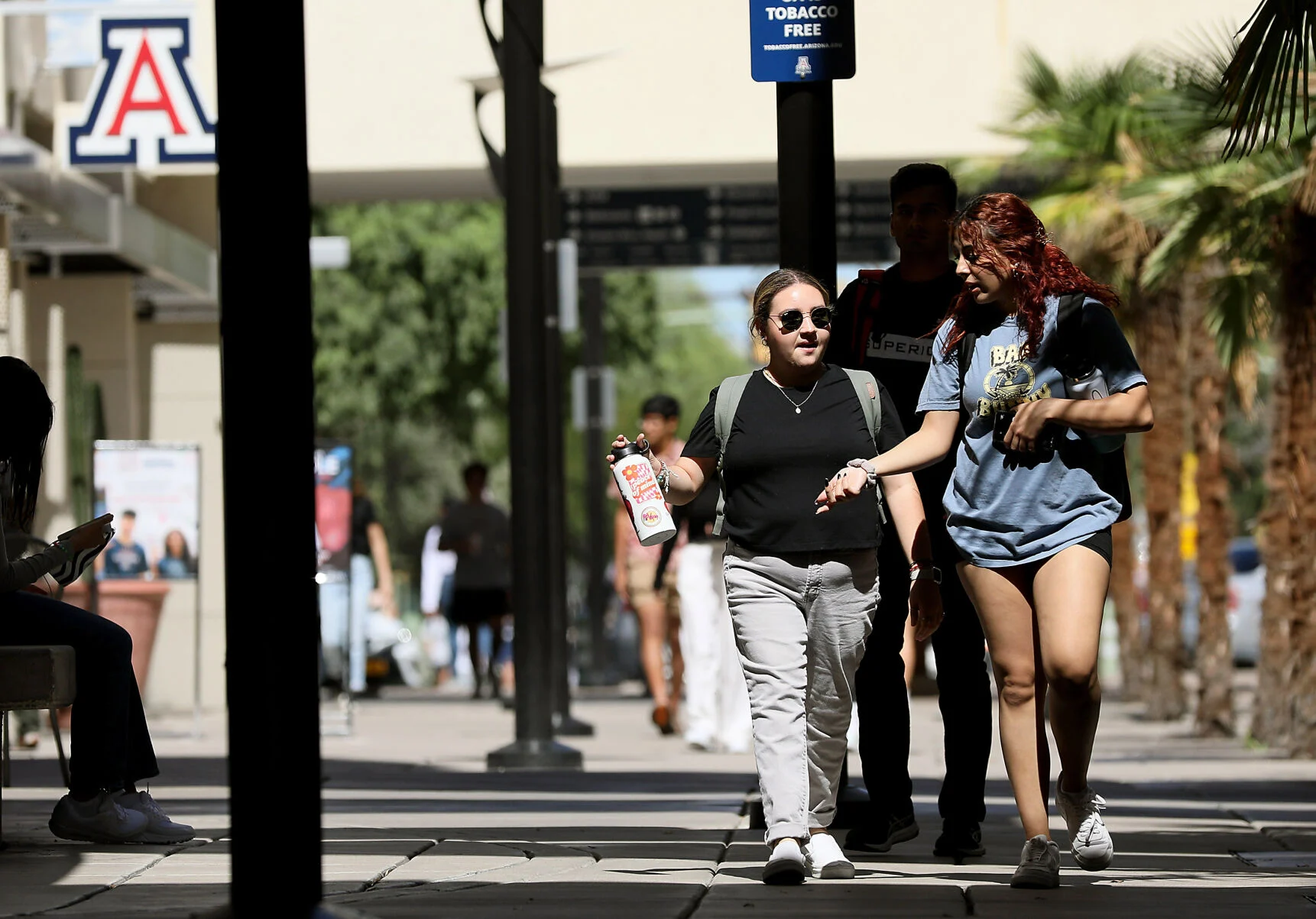Arizona Daily Star, October 9, 2022
A new proposition on the November ballot would expand access to higher education for many high school graduates in Tucson and across the state.
Proposition 308 would allow many people who have lived in Arizona for two or more years and graduated from an Arizona high school to pay the resident tuition rate at the state’s public colleges by repealing parts of an earlier initiative.
That’s a big savings. For example, at the University of Arizona this school year, in-state fees and tuition for students is $13,200 a year. It climbs to $39,600 a year for out-of-state students.
More than 3,600 undocumented Arizona residents, including older potential students, would benefit yearly from an in-state tuition policy, according to estimates from the The American Immigration Council. And about 2,000 undocumented students graduate from Arizona high schools each year, according to the Migration Policy Institute.
One of those students, 2022 TUSD graduate Angela Cervantes, came to the U.S. as a child after her mother died of cancer. The family was struggling financially, and her father decided it would be better for her and her younger brother, who is a U.S. citizen, to live in Arizona.
She attended middle and high school in Tucson Unified. She played on her high school softball team, and she was a member of the school’s National Honor Society club and a Latinx drama club. She knew she was born in Hermosillo, Sonora, but it wasn’t until high school that Cervantes began to realize how heavily that fact would affect her life and future.
First, her friends got their learners permit, and she could not. Then they started to apply for financial assistance to attend college, and she realized that she could not apply for that same assistance.
“My entire senior year of high school was spent trying to cope with the fact that neither me nor my family had enough money to pay the cost of attendance of a community college yet alone a four-year university,” she said. “I began to explore all my possibilities in order to decide what would be best for me. I considered taking a gap year in order to figure out my financial situation, at one point I even considered going back to Mexico.”
Currently, students like Cervantes are excluded from paying in-state tuition to Arizona’s universities and colleges, which is about a third of the out-of-state rate, because of a 2006 voter-approved measure that prohibits anyone who isn’t a U.S. citizen or legal resident from being designated as an in-state student for tuition rates at either community college or state universities.
Some undocumented students qualify to pay 150% of in-state tuition, based on an Arizona Board of Regents policy passed in 2015 and expanded in 2019 that says these students may qualify for the mid-range tuition fees if they attended Arizona high schools for at least three years.
As well, undocumented students aren’t eligible to receive federal or state financial aid.
Prop 308 seems to have broad bipartisan support, with many education, business, faith and civic leaders from both political parties speaking in favor of it, saying expanding access to education for more young people in the state will help support the workforce needs and grow the state’s economy.
The business community has been focused on workforce development for over a decade, which is a challenge for Arizona but also for the rest of the country, says Todd Sanders, president and CEO of the Greater Phoenix Chamber, who wrote an argument in favor of the initiative in the general election publicity pamphlet. He says dreamers, people who were brought into the U.S. undocumented as children and have legal status under DACA, are part of the solution.
“These are roughly 2,000 kids who have attended Arizona high schools, who are committed to our state and who want to go and increase their level of education through the university or the community college system, which means that they can be an important part of our economy as they graduate with some credentials and are able to go into the workforce, and that’s critical in a place like Arizona, where there are more jobs than people,” he said.
There is currently a labor shortage in the state across many industries, including health care, financial services and advanced manufacturing, Sanders says.
At least 18 states and the District of Columbia already offer in-state tuition to qualifying students regardless of immigration status, according to the Associated Press, including Texas, Nevada and Utah.
“I think Arizona should be the next state to do that,” Sanders says. “And hopefully, the voters will see that as a plus as well, because this could put us at a disadvantage with some of our competitor states.”
While Sanders hopes voters approve the initiative, he says ultimately there needs to be significant changes to the country’s immigration system.
“If we could get the left and the right to agree to at least start the conversation, I think it would go a long way in really creating the right path for people going forward,” he said.
“This country was built by immigrants. That hasn’t changed. It’s not going to change. We’re going to need people coming into this country to continue to build the country and to build our economy. And we need to be able to do that in a rational way,” he said.
The president and CEO of the Arizona Chamber of Commerce and Industry also wrote an argument in favor of the proposition.
Under current conditions, there will be an annual workforce shortage of people with bachelor’s degrees of 26,300, “leaving Arizona’s workforce unprepared,” Danny Seiden said.
“If we are going to remain an attractive destination for job creators and continue to meet evolving workforce demands, we must do more to encourage all Arizona learners to pursue an education after high school,” he said. “That includes removing artificial and unnecessary barriers to an accessible and affordable college degree.”
Arizona Republican State Sen. Paul Boyer introduced the measure for the ballot and it was passed by both houses, but a majority of Republicans opposed it, according to the Associated Press.
One of the few arguments against the measure in the election pamphlet was sponsored by the Arizona Republican Party.
The proposition is attempting to solve a problem with high college tuition costs by providing “taxpayer-funded subsidies,” wrote party chairwoman Kelli Ward and secretary Yvonne Cahill. The argument also said the bill would lead to an increase in taxes statewide.
Neither the Republican Party of Arizona, Ward or Cahill responded to questions from the Star about how it would raise taxes, or what they meant by “taxpayer-funded subsidies” since the initiative doesn’t mention any type of subsidy.
The Joint Legislative Budget Committee analysis of the proposition does not anticipate it will affect state spending at universities, but because of different funding formulas, it could increase spending at community colleges if it incentivizes new students to enroll. While they estimate that tuition collections would decline, enrollment being accessible to more students could offset the impact.
The budget committee’s analysis did not estimate the proposition’s indirect economic impacts, like the impacts from an increase in college graduates in the state.
Being able to earn a college degree could boost the earnings of Arizona’s dreamers more than $28 million annually, according to the American Immigration Council. The nonprofit immigrant advocacy group estimates having this broader access to in-state tuition could raise an additional $4.9 million per year in federal income taxes and state and local taxes.
Research from the American Immigration Council Research highlights ways student Dreamers play an important role in Arizona’s economy, including in fields like healthcare, education and the skilled trades.
Cervantes graduated from Cholla High School in May, and she’s a freshman at Grand Canyon University where she’s majoring in justice studies. She wants to go to law school and become an immigration lawyer.
Being a private school, Grand Canyon University allowed her in-state tuition and also partners with the scholarship she got. The school is in Phoenix, so she has to do it online because even though she works, she can’t currently afford housing in Phoenix.
If 308 passes, she hopes she might be able to transfer to the University of Arizona, so she could live at home while attending school in person.
“I think the proposition is a really important thing that people should really look into because it doesn’t just benefit us undocumented students, but the economy and the community of Arizona as a whole,” Cervantes says.
Contact reporter Danyelle Khmara at dkhmara@tucson.com or 573-4223. On Twitter: @DanyelleKhmara


